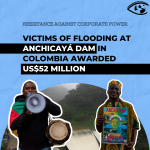Bulgarian Ski Complex Threatens Rila National Park

The Seven Lakes of the snow-capped Rila mountains of south-western Bulgaria lie nestled in a valley just below Musala, the highest peak in the country. The ancient name of the mountains refers to an abundance of water; in addition to glacial lakes and hot springs, four major rivers find their source in these snow-capped mountains.
Recently, however, the quiet beauty of the region has been broken by the whine of chain saws carving away at the forest below the lakes. A network of dirt roads now provides access for earth-moving vehicles. Just above the first lake, aptly named "The Tear," excavation equipment clears the way for a new chair lift to bring in ski tourists. Beside the lift, one of the national park's backcountry chalets is being transformed into the "Edelweiss Resort," a benchmark construction for the ski area developers.
The Rila Mountain ski project reflects a national frenzy to cash in on an anticipated tourist boom in Bulgaria. In the last seven years, tourism revenues in the country have increased 18 per cent and arrivals are projected to grow from 4.8 million visitors in 2005 to 20 million by 2020. Property values in popular destinations have increased by 20 to 30 percent in the past year alone.
Here among the highest mountains of the region, the construction of a new ski complex promises jobs and economic growth in one of the poorer countries to join the European Union (EU). On the one hand it sounds as though business is riding to the rescue of an impoverished area in former socialist Eastern Europe. On closer inspection, however, the brave new world of free enterprise in Rila National Park looks more like a corporate scam that is taking advantage of compliant police and politicians, while causing massive environmental destruction.
For example, a few weeks ago, environmental activists from Za Zemiata (For the Earth) took journalists (including this reporter) to the site of the proposed $147 million project. Suddenly, a group of men appeared and threatened to kill the activists. Shortly afterwards, police turned up. They said nothing to the thugs but warned the activists: "Next time we might show up too late." They then helped the thugs force the journalists and the activists back into their vehicles.
Rila Sport
A small ski area called Panichishte has existed in the Seven Lakes region since the late 1970s - prior to the designation of Rila National Park in 1992. In 2006 a municipality bordering the park sold 200 hectares around Panichishte - directly, without public auction - to a company named Rila Sport, the Bulgarian management company that oversees the ski resort development, for a reported 7 Euros ($10.30) per square meter. Slaveiko Staikov, managing director of Rila Sport, maintains the legality of the sale. He says, "We even paid more than the market price, just to make sure that the municipality wouldn't be accused of illegal actions."
Claims by developers to the Bulgarian media suggest that 10,000 hotel-beds will be built around Rila National Park in the next few years, increasing capacity five times to create a "new mega ski-area." Stimulated by the speculation, land in the same area now sells for up to 80 Euros a square meter. And apartments that are still on the drawing board are being sold on the Internet for as much as 1,300 Euros per square meter.
Who Owns the Ski Complexes?
Investors in Rila Sport include: ⢠Slaveiko Staikov and Tihomir Ivanov Trendafilov, who together own a 1 percent stake in Rila Sport, act as official representatives of the company. ⢠Reelstone Trading Business Corporation, a company registered in Great Britain, owns 99 percent of Rila Sport. Reelstone is apparently owned by a coalition of Austrian and Italian investors whom Staikov and Trendafilov refuse to identify. Interestingly, Reelstone Trading Business Corporation is not just an investor in ski resorts planned by Rila Sport. It also jointly owns a company with the local municipality, which sold land around Panichishte to Rila Sport. Reelstone Trading Business Corporation controls 76 percent of a company named Atomic Invest, while the municipality owns 24 percent. Atomic Invest has received thousands of hectares of municipality land in the Rila Buffer Zone. Likewise, the Bansko project is a joint venture between: ⢠Bansko Municipality which owns 12 percent. ⢠Alpenwald Tourist-Bulgaria (51 percent), which is partially owned by offshore investors that the company refuses to identify. ⢠Ski Engineering (31 percent), and Pirin Tourist (3 percent). The Bansko project was funded by the Bulgarian First Investment Bank (BFIB). Until 2006, BFIB was 20 percent owned by the multilateral European Bank for Reconstruction and Development (EBRD), which recently sold its stake in the project. Bankwatch and other European NGOs campaigned against the EBRD between 2002-2005, maintaining that the project violates the environmental procedures of the bank. |
But no concession agreement has been made with the Rila National Park authorities to establish terms for the project. Indeed no official plans have ever been released, despite repeated attempts by local citizens, environmental activists and journalists to access information about the project. This is contrary to the 2002 Environmental Protection Act in Bulgaria that promises transparency and public participation in the review of planned developments.
Tree-felling in the area is now widespread. Loggers claim to be creating firebreaks, although there is no plan for such activity. Environmentalists from Balkani Green, an environmental group that monitors biodiversity in the Balkans, say that the "firebreaks" may really be a cover to build ski runs without a permit. A major road to the base of the ski area is also being constructed without environmental permits, and several new building projects around the park boundaries have begun. But Sasho Ivanov, mayor of the municipality, insists that all of this is perfectly legal.
European Wilderness Area Threatened
The Rila National Park is certified as part of the Protected Areas Network (PAN) developed by the World Wide Fund for Nature (WWF) and Molecaten, a Dutch sustainable tourism group. It is one of Europe's largest protected areas and contains unspoiled tracts of wilderness, a rarity on the continent.
The diversity of flora and fauna in the Rila Mountains is rich - 17 plant species are endemic to the area, while 15 are threatened and 2 are endangered. Among the animal species exist numerous glacial relicts, including the snow vole, one of 158 species protected by the Berne Convention on the Conservation of European Wildlife and Natural Habitats.
Through the PAN program, international visitors can hire local guides and stay in small-scale lodges in the Rila Mountains. Initiatives funded by WWF, Molecaten and the EU provided training for local residents about the development of eco-tourism around the national park.
The park's management plan, on which PAN certification is based, envisages environmentally-sound projects and in no way provides for ski area expansion, say park staff. The rangers are especially horrified at the recent construction. "Before there was hiking, now Jeeps!" said one ranger who was clearly worried that the invasion of motorized vehicles might affect the delicate ecological balance of the area. He refused to identified because he was worried about losing his job.
Vania Milanova, from the local tourist cooperative, however, is openly dismayed. From one of the few remaining backcountry lodges under the cooperative's care, she points to a spring where offerings are often placed by local people, a practice that she says reflects the spiritual value accorded the Rila Lakes by many Bulgarian people. She asks, "Why isn't the government doing anything to stop the destruction?"
While the construction of new roads, logging and a ski lift occurs inside the Rila National Park boundary, other major developments, including additional roads, hotels and apartments are planned in the surrounding areas. Much of this construction falls in what is known as the "Rila Buffer Zone" - an area surveyed by EU funded Danish scientists in 2004 - as part of the "Natura 2000" network of areas to promote biodiversity throughout Europe. As part of the network, all developments would be subject to review according to environmental standards established by an EU initiative.
On November 29, 2007, the Bulgarian Ministry of the Environment and Water removed the area from the list that it submitted to the European Commission, claiming to have scientific proof for its omission. This action has brought the Bulgarian Ministry of the Environment under serious scrutiny by local and international environmental organizations. Action for Solidarity, Environment, Equality, and Diversity (ASEED), an international environmental group based in the Netherlands, has publicly denounced the decision and expressed its concern about the future of Rila National Park. This mirrors concerns by WWF about the park's PAN certification.
Repeating Previous Mistakes
Neli Arabadzhieva, international coordinator for Let Nature Remain in Bulgaria, a coalition of 17 non-governmental organizations (NGOs), sees the ski area construction around Rila as a continuation of illegal practices in other protected areas, especially around Pirin National Park, another zone valued for its biodiversity in south-western Bulgaria: "This is what we saw happening seven years ago when developers began expansion of the Bansko ski zone," says Arabadzhieva.
Bansko, just outside the Pirin Park, was once a picturesque village with a few small ski runs. Since 2000, however, the ski area and nearby town have grown rapidly. Today, over 100 hectares of the park have been deforested and built on, to make way for 12 new ski slopes, 21 ski lifts, an artificial lake and three roads, plus numerous buildings. Last August, flooding occurred in Bansko town as a result of logging, mountain erosion and construction. In October the mayor declared a two-year construction moratorium. Some developers ignored the ban, others are now looking to new areas.
There, too, activists who recorded illegal logging and other offenses were threatened with violence. "Corruption is rampant," says Ivan Sirleshtov of the Bansko Initiative Committee, formed to fight graft, particularly illegal land appropriations used for tourism development.
Complaints Filed with European Commission
Cveta Hrestova, protected areas representative of Let Nature Remain, says that her group has gathered videos, photographs and surveys to document corporate law-breaking in protected areas, yet the Ministry of the Environment has only addressed minor violations. As Svilen Ovcharov, the lawyer for Let Nature Remain, explains: "Only Bulgarian public prosecutors can begin legal proceedings against the developers."
Because of such oversights by the Bulgarian Government, the Let Nature Remain coalition has filed a complaint with the European Commission. A letter was sent to the European Police on November 30, 2007, following the Natura 2000 decision, demanding an investigation of the developments in the Rila Mountains, including those around the Seven Lakes.
The complaint accuses the companies involved in three "megalomaniac ski complexes" of "illegal and inexpedient business transactions" and alleges "serious crimes committed in the destruction of some of our most significant natural resources."
"We ask for compliance with Bulgarian law," says Hrestova. She told CorpWatch: "Throughout the country, the short-term interests of investors have taken precedence over a sustainable future for the Bulgarian republic."
But due to European Commission bureaucratic procedures, it will probably take months before the complaint will be addressed. In the meantime, construction continues in Rila National Park with some of the ski runs projected to open as early as this winter season.
This article was made possible by a generous grant from the Hurd Foundation.
- 183 Environment



